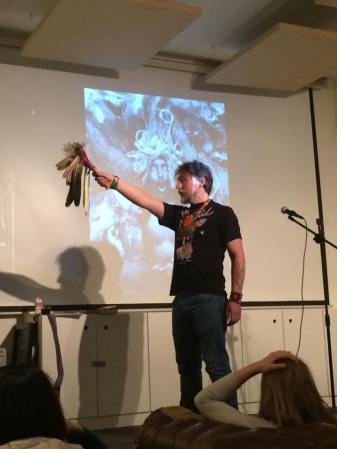I thought this talk would be a load of pretentious shite as I’m dubious about guys wearing South American jewellery and calling themselves shamans.
However, I was pleasantly surprised by Jez Hughes as he outlined his harrowing mental health experiences and arrival at some semblance of peace via the shamanic path, taking him to his current position of shamanic healer and knowledge spreader.
Funzing Talks are a platform for anyone with an interesting skill, passion or hobby to share and Jez noted that this particular talk of his always goes down well and tends to be sold out. So it obviously strikes a significant chord among the increasing numbers of us afflicted with elements of mental ill health with a sense there’s something more going on than a random chemical imbalance in the brain.

From the outset of his talk, Jez was emphatic that he had no intention of glamorising either mental illness or shamanism, describing them as both ‘really tough’ on a human and emotional level. The initial calling of a shaman, or healer, by the gods is what he then laid out as parallel to the manifestation of what we term ‘mental illness’.
Whatever the symptoms – psychosis, depression, hysteria – they are indicative of a person being taken apart, in shamanic language by spirits but in psychological lingo approximating more the rising up of the unconscious with all its archetypal associations. Jez noted the often religious content of psychosis: the imagery of God/Satan/angels or even aliens as the modern personification of the unknown, the invisible.
He cited trauma as a regular trigger for this process, possibly years after the event and on the back of some other life occurrence which brings everything to the surface for integration. Depression is a shutting down in reaction to this, hysteria is getting completely carried away by it, while another regular reaction manifests as an obsessive need for control. In the shamanic tradition the individual at this point is taken away from their community to be assisted through the initiation process, often entailing gruelling elements such as sleep deprivation or fasting.
Indigenous communities go towards these phenomena to pay attention and give them space (‘Spirits are like the mafia: once they come knocking, you politely agree to do what they say.’) whereas societies like ours prioritise repressing them, shutting them down, pathologising the process and medicating it: ‘We’re terrified of what goes outside the norm.’
Jez noted that people to whom this process occurs tend to be overly empathic and open; they could be seen to be feeling the ‘illness’ of the whole society they live in, their ancestors, the land. The painful experiences are the very thing which qualify them to take up their healing role (the fabled ‘wounded healer’).
He recounted the story of a healing he carried out for a mental health professional originally from Africa who told him about a relative experiencing psychotic episodes. When he gave her the shamanic perspective of what was happening, she responded: ‘That’s exactly what we believe back home.’ Listening to the content of the psychosis, the visions can provide a way of picking up on the messages coming from the spirit world.
At that exact moment someone’s phone rang in the audience, prompting a ‘See? You have been chosen!’ from the host (it was LOL at the time).
Anyone for whom the idea of mental illness as shamanic initiation resonates is advised the following by Jez to get through the dark night of the soul taking them towards their purpose as a healer:
- Keep your sense of humour. Laughing is very grounding. Do not lose the ability to laugh at yourself, in particular
- Stay connected with nature. Walk barefoot on the ground. Go to the beach, to a river and put flowers in it. Make a fire. Go to a tree and make it an offering (a coin, for example, which is full of the Earth’s minerals). Give thanks for your life.
- Sit with your emotions and witness them, rather than push them down or run away from them
- Don’t close yourself to the possibility of taking medication: it has its place
- Pray. Or, if you’re uncomfortable with that word, silently acknowledge that you are surrounded by guiding spirits at all times. Thank them.
- Support a crap football team: fail-safe way to remain down to earth


You stated simply a truth that could change understanding of mental illness. I spent an entire life trying to heal from sadness. I reference the Hmung often when I explain my own gift of the energy. How they think that mental illness is not illness but someone who can speak to the dead and needs to be guided through the confusion. Obviously, I state it in an simple undeucated manner. I just think that the population of people with mental health issues are just much closer to ascension so have available to them gifts that all people do. It really is of no consequence my own understanding. I just like what you wrote. I appreciate you.
LikeLiked by 1 person
Thank you, I appreciate you also. What you say about ascension really strikes a chord with me, and what I’ve learnt is the fundamental importance of grounding: ungrounded ascension = mental illness in its various forms. We’re definitely living through a paradigm shift which I’m very grateful to be a part of, I’m sure you are too!
LikeLike
[…] the shamanic practitioner Jez Hughes outlined in his talk detailed in my previous post, there’s an element of feeling the ‘illness’ of society as a whole in these […]
LikeLike